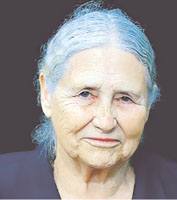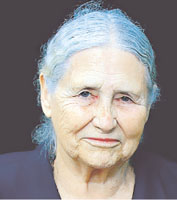
Faces & TracesBritish author Doris Lessing bags 2007 Nobel Literature Prize [Archives:2008/1140/Culture]
March 24 2008
 |
For The Yemen Times
Although her name hadn't been circulated widely among literary and cultural circles for the 2007 Nobel Prize for literature, British author Doris Lessing won the prize, making her the 11th female ever to win the prize in literature.
Throughout her long and complex career, Lessing has traversed the savannahs of Africa, the crooked streets of London and the chilly reaches of outer space. Announcing her win, the Swedish Academy described her as “that epicist of the female experience, who with skepticism, fire and visionary power has subjected a divided civilization to scrutiny.”
Born Oct. 22, 1919 in Kermanshah, Iran to immigrant British parents, Lessing and her family subsequently moved to the southern part of Africa, where she spent her childhood on her father's farm in what was then Southern Rhodesia (now Zimbabwe). Following the end of her second marriage in 1949, she moved to England, settling in London.
Lessing's fiction criticizes colonial attitudes toward race, politics and women's roles in society while her later novels envision a world where science leads to disaster. She once was described as “the archaeologist of human relations,” writing persuasively about politics, feminism, communism and black-white relations in Africa.
Lessing's fiction commonly is divided into three distinct phases: the communist theme (1944-1956), during which she wrote about radical social issues, the psychological theme (1956-1969) and the Sufi theme (post-1969), which she explored in a science fiction setting in the “Canopus” series.
Her first novel, 1950's “The Grass is Singing,” explored the complacency and shallowness of white colonial society in southern Africa and established Lessing as a talented young novelist.
Among her works is a volume of short stories published in 1964 as “African Stories” and a five-novel sequence, “Children of Violence” (1952-1969), a largely autobiographical account of the fictional central character, Martha Quest. The five books in the series are: “Martha Quest” (1952), “A Proper Marriage” (1954), “A Ripple from the Storm” (1958), “Landlocked” (1965) and “The Four-Gated City” (1969).
Lessing likely was awarded the Nobel Prize for her best-known novel, “The Golden Notebook” (1962), which remains widely read and studied in universities, in addition to being awarded the 1976 French Prix Medicis for Foreigners.
The novel concerns Anna Wulf, a writer caught in a personal and artistic crisis, who sees her life compartmentalized into various roles – woman, lover, writer, political activist. Her dairies, written in different colored notebooks, each correspond to a different part of herself. Anna eventually suffers a mental breakdown and it's only through this disintegration that she's able to discover a new wholeness, which she writes about in the final notebook.
A prolific author, Lessing's other novels include “The Summer Before the Dark” (1973), a woman's journey into self-knowledge, and “The Good Terrorist” (1985), the story of a group of political activists who set up a squat in London. The book was awarded W.H. Smith's 1985 Literary Award.
“The Fifth Child” (1988) is the story of a family destroyed by the birth of a violent and brutal child, while “Mara and Dann: An Adventure” (1999) is the odyssey of two children and “The Sweetest Dream” (2001) is a family saga set in London and Africa.
Her short story volumes include: “The Habit of Loving” (1957), “The Story of a Non-Marrying Man” (1972) and “The Real Thing” (1992).
Lessing also penned two autobiographical volumes, which were awarded the James Tait Black Memorial Prize in 1995: “Under My Skin: My Autobiography to 1949” (1994) and “Walking in the Shade: My Autobiography, 1949-1962” (1997).
Her recent books include: “The Grandmothers” (2003), a collection of four short novels centered on an unconventional extended family, and “Time Bites” (2004), a selection of essays based on her life experiences. Her latest and most recent novel is 2007's “The Cleft.”
Harvard University awarded Lessing an honorary degree in June 1995. Other awards include the 1958 Somerset Prize for Fiction, the Man Booker Prize for Fiction for the British Commonwealth and Ireland (1971, 1981 and 1985), the 1999 Companion of Honor from Queen Elizabeth II, the 2001 David Cohen British Literature Prize, the 2001 Companion of Honor from the Royal Society of Literature and the Man Booker International Prize in 2005 and 2007.
After winning the Nobel Prize for literature, Lessing, who still resides in London, commented, “Why do the Noble Prize officials admire me now after hating me in the past? Since they can't award a dead person, I think they've decided that it's better to grant me the award before I pass away!”
——
[archive-e:1140-v:18-y:2008-d:2008-03-24-p:culture]


